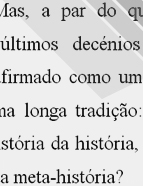

................................
In the context of historical studies in Portugal, the field of history of historiography was a peripheral field for a long time as a specific approach with some degree of autonomy. However, in line with developments in other European countries, it has garnered significant interest among Portuguese historians over the past two decades, establishing itself as an area closely connected with cultural history. This development stems from a long-standing tradition: Portuguese historians and essayists have consistently valued the history of history, from the late 18th century to the present day, yet In what ways has this meta-history evolved?
In the early 19th century, the Enlightenment scholar Abbot Correia da Serra, one of the founders of the Royal Academy of Sciences (1779), offered a critical perspective on historical studies in Portugal during the 18th century: "Parmi les histoires des peuples européens, celle des Portugais est peut-être une des moins avancées; non qu’il y ait disette d’ouvrages sur cette matière, mais les ouvrages sont les échos les uns des autres, et dans le dix-septième siècle surtout un certain esprit fanfaron s’était emparé des historiens de toute la péninsule espagnole. Une autre maladie historique, qui consiste à inventer des fables au lieu de constater des faits, s’était manifestée au seizième siècle en Italie (...): elle infecta les Espagnols (...) et se communiqua par là aux historiens portugais" ("Coup d’ oeil sur l’état des sciences et des lettres...", in Adrien Balbi , Essai statistique..., 1822, CCCXLVI). Educated in the rationalist spirit of the Enlightenment, Correia da Serra was one of the key proponents of research within the Academy of Sciences in Lisbon. His interest in historical memory, which he considered “absolument nécessaire”, is thus understandable. He firmly believ ed that it could explain national laws and customs. Within the scope of this Academy, research and archive inventories were developed (1788–1795), and there was even the idea of producing a renewed history of Portugal. (It should be noted, however, that within the Royal Academy of Portuguese History, founded in 1720 and dissolved by the mid-18th century, the idea of a history of Portugal with a new chorographic dimension had already been asserted.) The intention was to break away from the earlier tradition of a history associated with rhetoric and eloquence, which merely elaborated on previous works. Instead, a paradigm of history as a science, grounded in documentary collections, began to take shape.
